- Author Jason Gerald gerald@how-what-advice.com.
- Public 2023-12-16 10:50.
- Last modified 2025-01-23 12:04.
The Google Play App Store is the primary marketplace for finding and downloading apps to Android devices, and is installed by default on most Android devices, but updates to the store are not always available immediately to all users. If you want to update your Google Play Store manually, you can do this easily by downloading the installation file from the internet. If your device doesn't have Google Play Store installed, you can install it manually as long as your device is rooted. This is especially useful for Kindle Fire owners. See Step 1 below to learn how.
Step
Method 1 of 2: Getting the Latest Version of Android
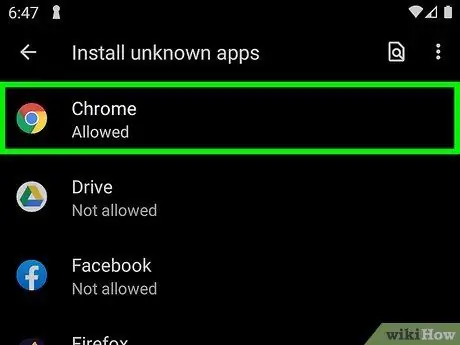
Step 1. Allow installation from unknown sources
Open the Settings app on your device and scroll down to the Security option. Just tap it to open the Security menu, then look for the Unknown sources box. Check this box to allow installation of apps from sources other than Google Play Store.
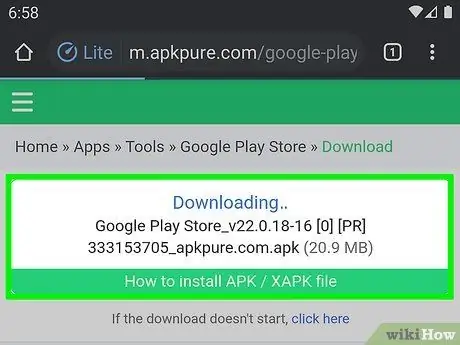
Step 2. Download the latest APK
Android apps are packaged as APK files, and can be downloaded from various sources on the internet. The Google Play Store app on your device will update automatically, but these updates may take some time to be delivered to your device. You can bypass this waiting time by downloading the APK from the internet and transferring it to your device.
- Use your device to download the APK file instead of your computer so you don't have to transfer your downloads.
- Make sure you download the latest version available, and that you download it from a trusted source, such as Android Police.
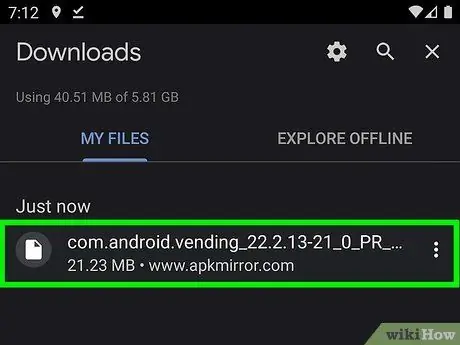
Step 3. Tap on the downloaded APK
Once the download is complete, go to the Notifications area and tap on the APK file. You will be warned that you are about to change a system program, which you can accept by tapping OK. Review the permissions and tap Install to start the APK installation.
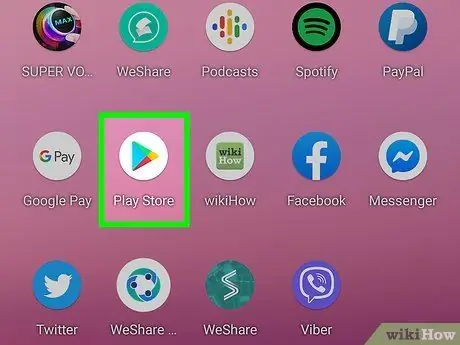
Step 4. Open Google Play Store
Once the installation is complete, you can open the Google Play Store and start browsing. If the Google Play Store app isn't on your Home Screen, you can find it in the App Drawer.
Method 2 of 2: Installing Google Play Store on Kindle Fire
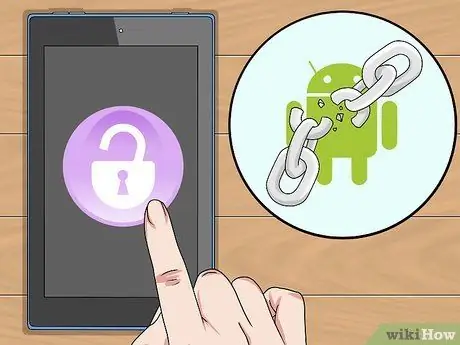
Step 1. Root your Kindle
The Amazon Kindle Fire runs a modified version of Android, but doesn't come with the Google Play Store. Instead, you're forced to use the Amazon App Store, which doesn't have many options. To install the Google Play Store, you will need to gain Root access on your Kindle Fire. You can't install the Google Play Store on an iOS device, Windows Phone, or BlackBerry phone.
- Download root software. You will need the "Root_with_Restore_by_Bin4ry" file, which can be found on the XDA Developers forums. Extract the file on your computer.
- Connect Kindle Fire to PC via USB. Open Device Manager (Start → Search → device manager) and expand the Portable Devices section. Right-click your Kindle and select Properties. Click the Drivers tab and click Uninstall. Unplug your Kindle from the PC.
- Download and install the Kindle ADB driver. This can be found on the XDA Developers forum.
- Open the Security menu in your Kindle's Settings menu. Change Enable ADB to on.
- Reconnect your Kindle Fire to your computer via USB. Wait for the drive to be reassembled.
- Open Root with the Restore folder that you extracted earlier. Double-click the RunMe.bat file. Select Option 1 from the menu that appears.
- Backup and restore your Kindle. Tap Backup My Data on the screen that appears on your Kindle. When the backup is complete, press any key on your computer. After that, press the Restore My Data option on your Kindle, then press any key on your computer when the process is complete.
- Allow your Kindle to reboot twice. After restarting for the first time, unlock the device then wait for your device to restart again.
- Restore your data again, press any key on your computer when finished, then wait for it to reboot again.
- Look for the Superuser app. Once the device finishes rebooting again, open the App Drawer and look for an app called Superuser. If it already exists, then the root operation has been successful.
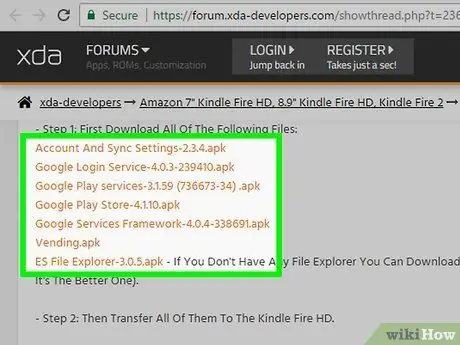
Step 2. Download the required APK
To install the Google Play Store, you'll need some Google APK files, as well as a file manager app. Download the following APKs, all of which can be found on the XDA forums or on Android Police. Make sure to download the latest version:
- Account And Sync Settings
- Google Login Service
- Google Play Services
- Google Play Store
- Google Services Framework
- Vending
- ES File Explorer
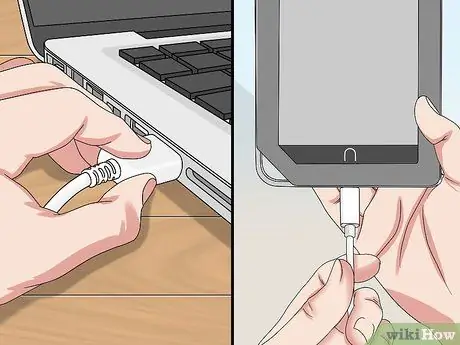
Step 3. Move the APK file to your Kindle
You can connect your Kindle to your computer and then transfer the APK file to Kindle storage. Place the file in an easily accessible location, such as the root folder.
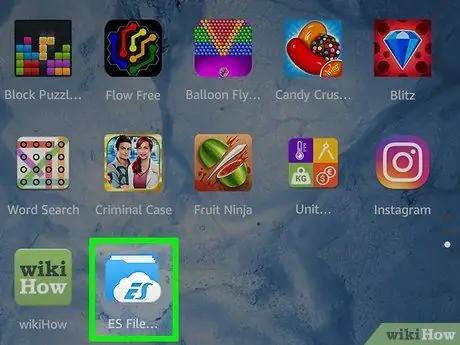
Step 4. Open ES File Explorer
Tap the Menu button, expand the Tools section, then tap Root Explorer. Select Mount R/W, then set both options to "RW".
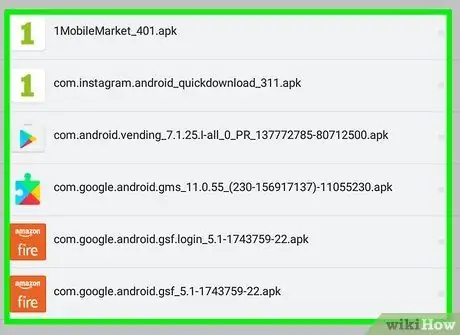
Step 5. Install the first set of APKs
Once ES File Explorer is configured, you are ready to start installing the APK. Navigate to the location where you copied the APK, and install the following four things, in this order:
- Account And Sync Settings
- Google Services Framework
- Google Login Service
- Google Play Services
- Reboot after installing the above APK.
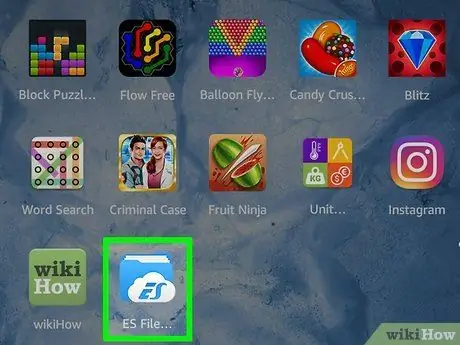
Step 6. Open ES Explorer
Navigate back to the remaining APKs and copy Vending.apk. You can copy it by long-pressing on the file and selecting Copy from the menu that appears. Paste it in the System/App folder and overwrite the existing files. Restart your device again.
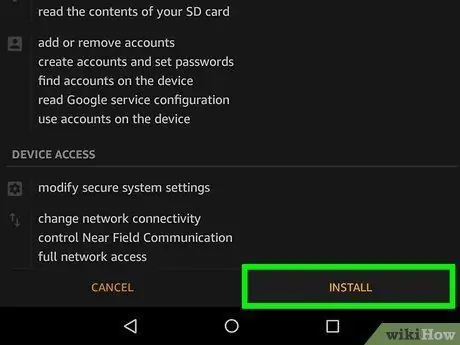
Step 7. Install Google Play Store
Open ES File Explorer and navigate to the Google Play Store APK you downloaded. Tap the file to start the installation.
Once the installation is complete, restart your device
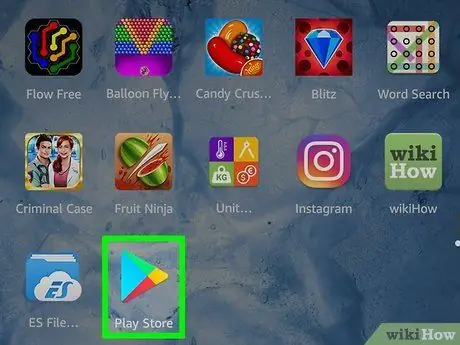
Step 8. Start your Google Play Store
Once the Kindle restarts, you can start the Google Play Store. You'll be asked to sign in with your Google account, which you can create for free if you don't have one.
Use the Google Play Store to download apps that aren't normally available through the Amazon App Store
Warning
- Google Play Store cannot be installed on Apple devices, no matter if the device has been modified or not.
- The Google Play Store cannot be installed on a PC, except through BlueStacks, which is an Android emulator.






